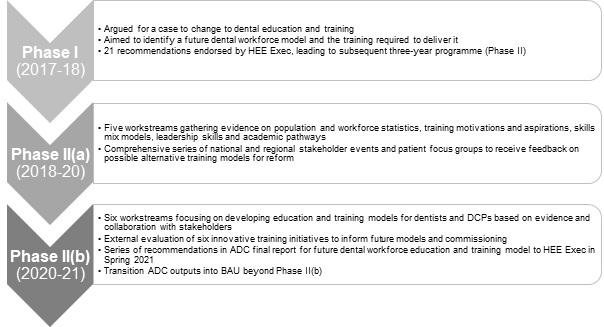You are here
Advancing Dental Care Phase II
Contents
The Advancing Dental Care: Education and Training Review aims to develop an education and training infrastructure that can respond to the changing needs of patients and services.
The ADC Review is now in its final year of Phase II, the three-year programme of work that began in April 2018 following the publication of ‘Advancing Dental Care’ that concluded Phase I activity (see Figure 1 for ADC programme activity and timeline).
We have moved into the final stretch of the Review at a time when dental services, education and training, and the NHS as a whole, is facing unprecedented challenges and disruption due to the COVID-19 pandemic. As of June 2020, dental practices are beginning to provide patient services though it will still take time to adjust to the new environment we find ourselves in; the ADC programme team is taking account of this. Lessons have been learned through the management of the pandemic, resulting in improved collaboration between organisations and better use of technology in teaching and supporting trainees. The ADC programme team and HEE Postgraduate Dental Deans are keen to embed this learning in new models of education and training for the whole dental team going forward.
Figure 1: ADC programme activity and timeline

During Phase II(a), carried out in 2018-20, the ADC programme team gathered evidence, through conducting research and engaging with stakeholders, to inform the future direction of our work. Phase II(a) highlighted the importance of:
- Having clear DCP training pathways and career progression as well as GDP, DCT and DST career progression options
- Developing more innovative models of postgraduate training
- Developing models aligned to workforce needs and expectations (e.g. part-time and step-on, step-off training)
- Forging stronger training links with primary and secondary care and recognising the importance of alternative pathways and prior accredited learning
- Developing a suitable model for the distribution of training posts based on our current understanding of population needs
Phase II(b), which is currently underway, concentrates on modelling flexible education and training programmes for the dental workforce, informed by the evidence we have been able to gather and more focused engagement with stakeholders. The six new workstreams, led by HEE Postgraduate Dental Deans are:
- Dental Foundation Training / Dental Core Training (year 1) modelling
- Dental Core Training (Year 2) / (Year 3) modelling
- Dental Specialty Training modelling and scoping of alternative models of accreditation
- Dental Care Professional training pathways
- Distribution of training posts
- GDP & DCP Career Development in primary care
There are clearly many points of crossover between the workstreams and the Leads will continue to integrate modelling where necessary.
Alongside Phase II(b) workstreams, an evaluation of existing training initiatives is being carried out by an external specialist team, SQW, enabling the ADC Review team to learn from existing best practice models of innovative training models and incorporate these findings into future education and training models.
The ADC review continues to focus on achieving its core aim: to develop a dental education and training infrastructure that supplies the NHS with a dental workforce which has the skills to respond to the changing oral health needs of patients and services. Through all of the work so far, and the ongoing support received from stakeholders, we are moving closer to reaching this goal.
Vlog 4
Malcolm Smith, Postgraduate Dental Dean for HEE North East and Chair of the Advancing Dental Care Programme, update us on the progress of Phase II of the Advancing Dental Care (ADC) Education and Training Review. Including, stakeholder events that have and are taking place.